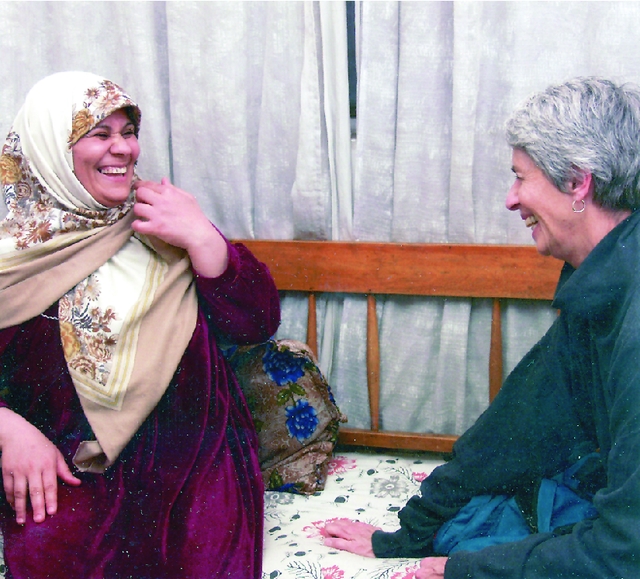Why isn’t the United States working to make Iran a close ally? Iran has enormous natural resources, a rich culture, an educated populace and a strategic position in the Middle East. In many ways, compared to its neighbors, Iran is a bulwark of civilization. So why does our government seek excuses to attack Iran instead of doing everything in its power to forge a friendship with this important nation?Dr. Kathleen O’Malley of Albuquerque can’t figure it out, either. She recently returned from two weeks in Iran with 23 other Americans on a trip sponsored by the Fellowship of Reconciliation, an interfaith peace organization. She traveled to Tehran, Isfahan, Shiraz, Qom and Persepolis. Her group met with Iran’s Minister of Culture. They met with Jews, Christians and Zoroastrians, and, of course, leaders of Islamic mosques. They met with students and faculty at the University of Tehran and clerics in the holy city of Qom.Her group also met with hundreds of regular Iraqis on the street, in markets, on buses, in restaurants and at Iran’s archaeological sites. O’Malley traveled with another New Mexican, the Reverend Barbara Dua of the New Mexico Conference of Churches. Their group included a Jewish businessman and devout Christians. Academics, a Native American woman and the director of Physicians for Social Responsibility made for a diverse group of American citizen-ambassadors.O’Malley saw a prosperous, educated, cultured people, who repeatedly told her how much they admired, even loved America—though they were very worried about George W. Bush. She saw a young population—65 percent of Iranians are under age 30—with demographics leading toward a more democratic, secular society. She saw a country where two-thirds of university students are women, a third of doctors are women, four-fifths of teachers are women and just about everyone is literate.It’s not America, certainly. All women must wear veils, a practice O’Malley and her female companions exercised. But it is a country ashamed of the posturing of its unpopular president (sound familiar?). It is a country that could eventually become an American ally, if only we can keep Bush from killing people who basically like us.“If we attack, it will be Iran’s 9/11,” O’Malley concludes. “There is much more political, cultural, religious and ethnic diversity in Iran than we realize. By attacking we play right into the hands of the Islamic extremists. The trends for democracy and a more secular, modern society will be snuffed out, just like our own civil liberties suffered after 9/11.” Iranians know what we’ve done to them before, even if most Americans don’t have a clue. O’Malley met with disfigured, crippled victims of the chemical weapons Saddam Hussein unleashed when he attacked Iran in 1980. That war killed more than a million Iranians at a time when the U.S. was an active, supportive ally of Saddam.America financed the 1953 coup that overthrew a democratically elected, nonviolent prime minister. Teddy Roosevelt’s grandson masterminded the CIA’s “Operation Ajax” to replace him with a shah who became Iran’s repressive dictator for three decades.Though Iranians know this history well, O’Malley found “the people were incredibly warm and hospitable, even with the current, growing threats they’re under from our country.”O’Malley realizes her group received a slanted perspective from government officials. She brought back far more meaningful conversations with ordinary Iranians. She went to connect with other human beings and share their stories with us. There is no better deterrent to war than realizing the people you are about to kill are just like you, your family and your friends.A young man in Tehran begged her to please ask the American people to read in their Bibles Jesus’ message of love and peace. If we attack Iran, will this student of Jesus Christ be among those we kill?O’Malley asked a victim of the chemical weapons we gave Saddam how he could ever forgive us. Yet he has already forgiven us and asks only that we understand the suffering we have caused. Will he die in the shock and awe we rain down on his neighborhood?A university professor tearfully told O’Malley how his 9-year-old son saw Bush’s threats on television and asked, “Daddy, are they going to kill us?” Are we? O’Malley has more to say than I can touch on in this column. She will share her experiences Sunday, April 29, 10:30 a.m. at the Nahalat Shalom synagogue and on Wednesday, May 23, 7 p.m., at Brasher Hall on the campus of the Central New Mexico Community College. Please go hear her. You owe it to everyone we will kill if Bush bombs Iran.
The opinions expressed are solely those of the author. E-mail jims@alibi.com.



